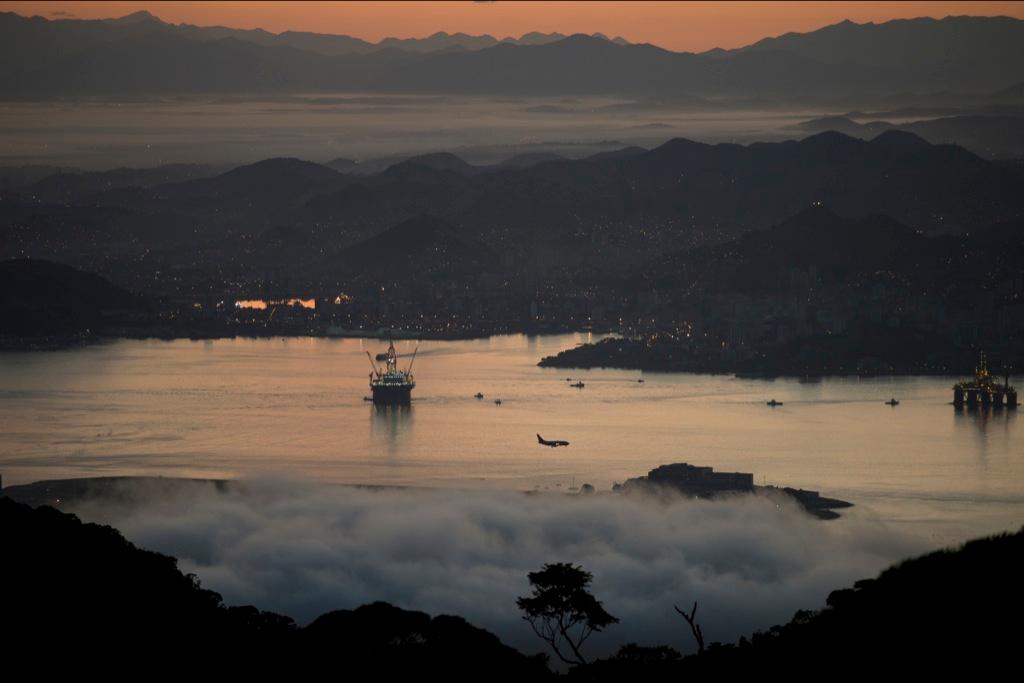Can Brazil meet US thirst for oil?
An airliner making its final approach (C) and oil rigs can be seen in this panorama of the Guanabara Bay at daybreak in Rio de Janeiro, Brazil, on May 24, 2012.
RIO DE JANEIRO, Brazil — Billions of barrels of oil lying beneath Brazil’s crystal waters are poised to help transform the Americas into the new Middle East.
Brazil’s national oil company, which uncovered the Western Hemisphere’s largest oil discovery in 30 years, has struggled to tap the gusher as quickly as planned.
When the wells start to flow, the man who manages the project’s finances knows where the crude is likely to go.
“The American consumer is our natural buyer,” he says.
Sitting in the Rio de Janeiro headquarters of Brazil’s national oil company, Petrobras Chief Financial Officer Almir Barbassa spoke soberly about the soaring plans that could turn Brazil into a global energy powerhouse.
Brazil believes its offshore oil will help double the nation’s reserves by the end of the decade, to 30 billion barrels.
Already, growing oil production in Brazil has fueled Petrobras' rise. The publicly traded corporation is 51 percent owned by the national government. Forbes ranks it 10th on its list of largest public global companies, putting Petrobras in the same tier as General Electric and Royal Dutch Shell.
More from GlobalPost: Brazil's growth has a monkey on its back
It has funneled billions into deepwater drilling research and earned a reputation as an international leader in developing offshore technology.
Brazil’s oil production has surged over the past decade as government policies drove the national effort to reach energy self-sufficiency. Production of liquid fuels has exceeded consumption since 2009, according to the US Energy Information Administration.
If Brazil meets its goals, it could be shipping 1.5 million barrels of oil off its shores by 2020. At those rates, it would rival the United States’ two largest Latin American suppliers — Mexico and Venezuela.
The US, the world’s largest oil consumer, is eager for new alternatives to the Middle East, where political upheaval threatens its energy supply. President Barack Obama traveled to Brazil’s capital in March 2011 and applauded Brazil’s massive oil find.
“When you’re ready to start selling, we want to be one of your best customers,” Obama said in his address to the CEO Business Summit in Brasilia.
But skeptics are questioning Petrobras’ lofty goals. Last week, the company cut its 2020 production target by more than 10 percent. The company projected its energy output would reach 6.4 million barrels of oil equivalent per day by the end of the decade. Now it has reduced that estimate to 5.7 million barrels.
Further strangling expectations, the nation’s own energy needs are rising. Brazilians themselves are demanding more energy as their expanding economy has put more vehicles on roads.
Besides requiring a rapid ramp up in oil field operations, producing the crude discovered in Brazil’s complex “pre-salt” offshore formations requires billions in expensive technology investment.
More from GlobalPost: When the BRICS crumble
Shipyard delays and workforce shortages also have exposed Petrobras’ challenges in reaching its target.
In fact, the company’s aspirations make retired Petrobras geologist Hernani Chaves chuckle.
“This is wishful thinking,” he says.
One stumbling block is legal. The business climate in Brazil, and the government’s extraordinary demands, are dissuading some foreign investors.
Chaves, now a researcher at the State University of Rio de Janeiro, noted that the company has commissioned a small army of colossal offshore vessels and equipment to be built from scratch. Petrobras scheduled to grow its fleet of drilling rigs under contract from the 25 on hand today to 65 by 2020. It plans to more than double the number of production platforms to 94.
“You can’t produce it like that,” Chaves said, snapping his fingers. “For this reason, there will be problems.”
Many of the equipment orders were contracted domestically, as officials push to develop Brazil’s nascent oil supply industry. But there are growing signs that the fledgling shipyards and over-taxed workforce are struggling to meet the needs of Brazil’s ambitious oil production goals.
“In 2008, we looked for rigs and drill ships. The Brazilian industry was not prepared to build them,” Barbassa said. “We work with what is possible to do.”
Petrobras missed its 2011 production target of 2.1 million barrels per day.
It isn’t the only company feeling the pinch. Labor and equipment shortages have affected foreign oil companies operating in Brazil.
Andre Araujo, president of Shell Brazil, said the company is making extra efforts to deal with difficulties in Brazil's market, particularly in developing its workforce. The Netherlands-based company has been bringing foreign employees to work its Brazilian fields, while sending young Brazilians to train in Shell’s operations in the US and Europe.
“We need vessels, we need rigs, we need pipelines, we need many products and services,” said Araujo. “We need them for tomorrow. We need them for five years from now and we need them for 10 years. That is where the challenge is.”
More from GlobalPost: Brazil: Rio shuts makeshit police-run jails
The pressure on Petrobras extends beyond its ability to meet the rapidly growing demand for oil inside and outside of its borders. Brazil’s general economic health is increasingly tied to Petrobras and the oil and gas industry.
Petrobras has budgeted $225 billion in global capital expenditures between 2011 and 2015. Of that, $140 billion is slated to be spent in Brazil, Barbassa said.
The Brazil expenditure equals about 7 percent of the nation’s gross domestic product.
“The impact of Petrobras on the Brazilian industry is going to be larger from now on,” Barbassa said.
